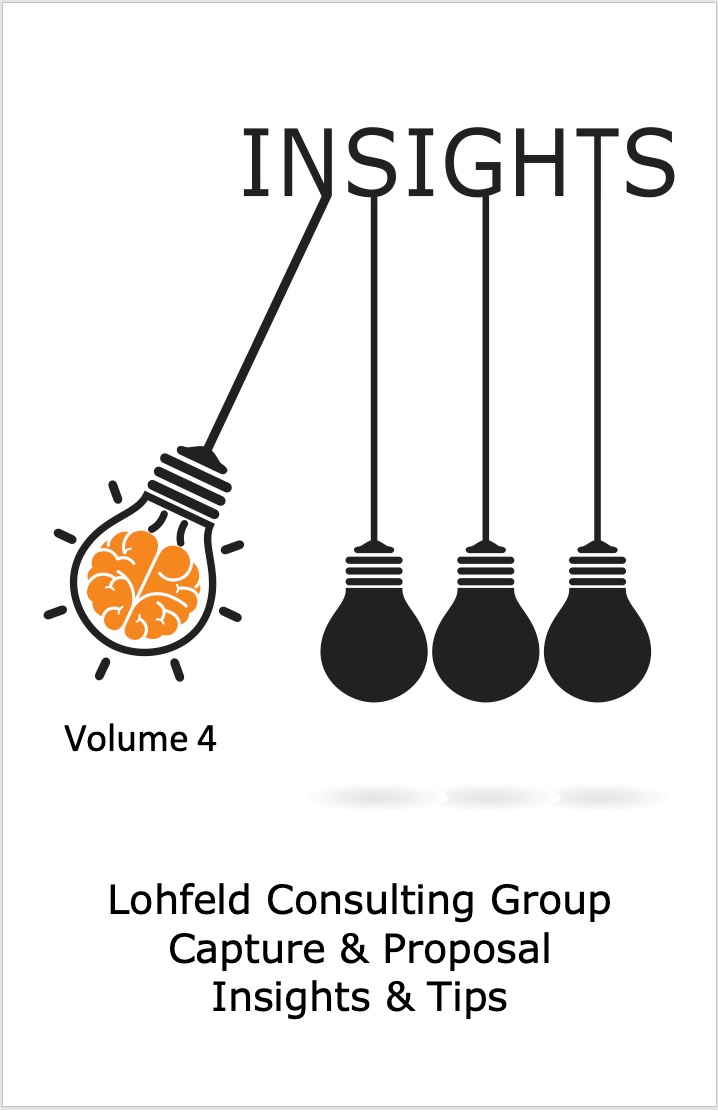The art of the data call: 7 questions to ask pre-RFP
 In today’s blog post, Lisa Pafe provides advice on 7 questions to ask before RFP release…
In today’s blog post, Lisa Pafe provides advice on 7 questions to ask before RFP release…
Over the past few months, I have served as a Color Team Reviewer on many proposals that, while compliant, had a glaring lack of proof points. When I debriefed the team, I told them that they had forgotten an important proposal task: the team-wide data call.
Unfortunately, too many companies limit data calls to resumes, past performance, and a company bio of revenues and full time employees (FTE). But, a data call should go beyond compliance; it must form the basis of persuasion.
Persuasion is what makes your proposal compelling. Data calls provide the grist for win themes, discriminators, features and benefits, call-out boxes, and action captions. At the most basic level, the data call is an information-gathering request, internal to your company and external to teaming partners, which specifies:
- Who: the point of contact (POC) for the data call
- What: the data you need
- When: the deadline for each data call (pre- and post-RFP)
- How: detailed instructions with clear due dates
Often, we delegate the data call to more junior staff, when in reality, an artful data call is tied very explicitly to the capture strategy. The Proposal Manager and Capture Manager should work together before the RFP is released to craft the data call by asking 7 questions:
- What information do we need to prove discriminators and win themes?
- Which data best illustrates our features and benefits?
- What proof points do we need?
- How can we discriminate our bid from the competition?
- What do the teaming partners bring to the table?
- What worked and what didn’t in past proposals?
- What information does this customer typically require in their solicitations?
Pre-RFP release, issue the data call and begin to aggregate and assess the data. After RFP release, you can issue a second data call for compliance purposes or to provide additional RFP-specific information.
By starting early, you gain the advantage of time. Often, gathering effective data is impossible when faced with a 10-day or even 30-day turnaround time. This approach puts you well on your way to a compelling proposal during the capture stage.
What advice do you have for developing effective data calls pre-RFP? Send an email to me at BWingate@LohfeldConsulting.com, and I’ll share your thoughts in upcoming posts!
Paperback or Kindle
10 steps to creating high-scoring proposals
by Bob Lohfeld
contributors Edited by Beth Wingate
Subscribe to our free ebrief
Teaming friends, frenemies, and enemies—12 tips to mitigate harmful effects
Did you know that contracting officers spend up to 20% of their time mitigating disputes between teaming partners? In an informal poll we conducted on LinkedIn last month, 40% of respondents classified their teaming partners as “frenemies” on their last bid.
Explore Further
- Advice (446)
- AI (5)
- APMP (17)
- Business Development (198)
- Capture Management (197)
- Favorite Books (5)
- Go-to-Market (27)
- Graphics (6)
- Lohfeld Books (3)
- Past Performance (58)
- Post-submission Phase (15)
- Pre-RFP Preparation (211)
- Proposal Management (270)
- Proposal Production (60)
- Proposal Reviews (27)
- Proposal Writing (77)
- Pursuit Phase (89)
- Research Report (2)
- Resources (60)
- Tools & Tips (259)
- Training (10)
- Uncategorized (220)

Sign Up for INSIGHTS and Download your FREE book
We'd love to help you with your proposals. Enjoy our complimentary Lohfeld Consulting Group Capture & Proposal Insights & Tips book with your FREE subscription to our Insights Newsletter.
GET YOUR FREE BOOK




